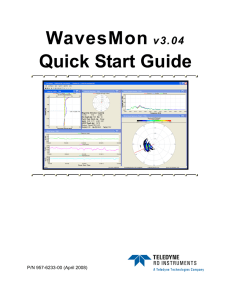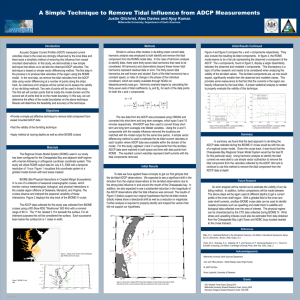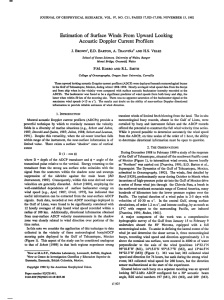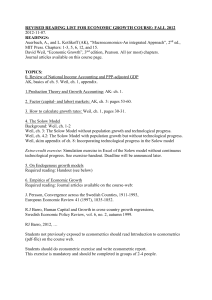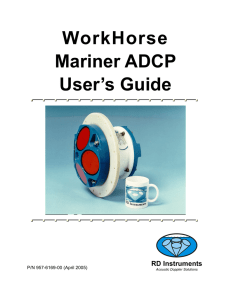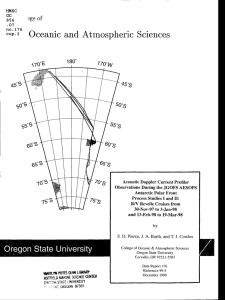syllabus_EOC6934_2014 - ESSIE
advertisement
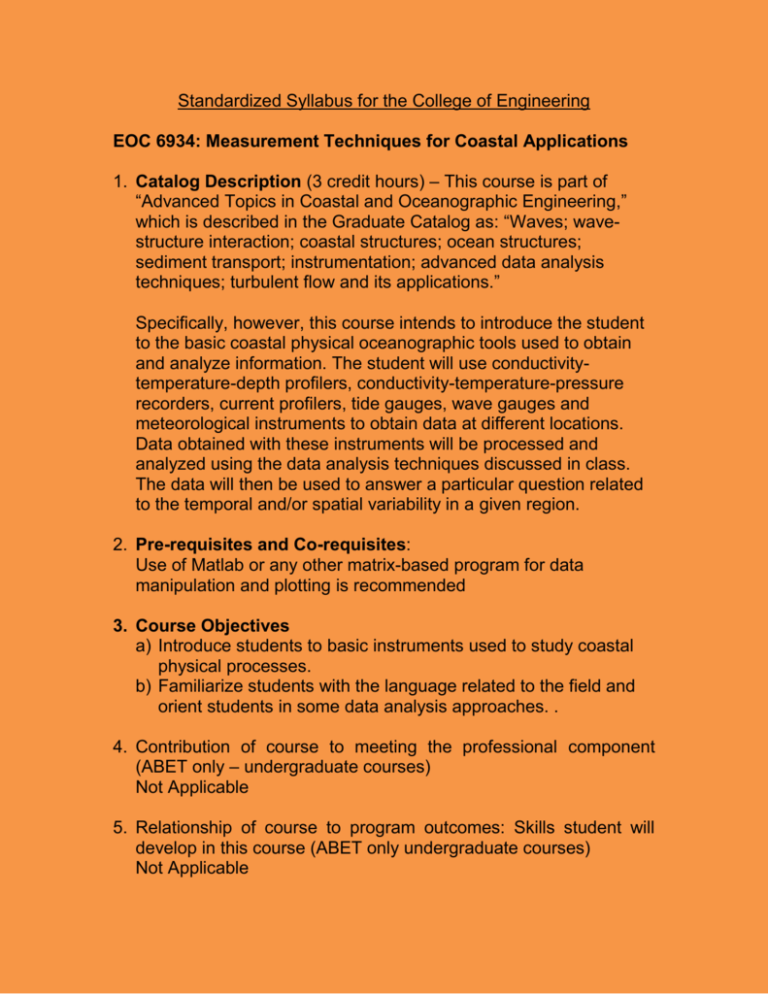
Standardized Syllabus for the College of Engineering EOC 6934: Measurement Techniques for Coastal Applications 1. Catalog Description (3 credit hours) – This course is part of “Advanced Topics in Coastal and Oceanographic Engineering,” which is described in the Graduate Catalog as: “Waves; wavestructure interaction; coastal structures; ocean structures; sediment transport; instrumentation; advanced data analysis techniques; turbulent flow and its applications.” Specifically, however, this course intends to introduce the student to the basic coastal physical oceanographic tools used to obtain and analyze information. The student will use conductivitytemperature-depth profilers, conductivity-temperature-pressure recorders, current profilers, tide gauges, wave gauges and meteorological instruments to obtain data at different locations. Data obtained with these instruments will be processed and analyzed using the data analysis techniques discussed in class. The data will then be used to answer a particular question related to the temporal and/or spatial variability in a given region. 2. Pre-requisites and Co-requisites: Use of Matlab or any other matrix-based program for data manipulation and plotting is recommended 3. Course Objectives a) Introduce students to basic instruments used to study coastal physical processes. b) Familiarize students with the language related to the field and orient students in some data analysis approaches. . 4. Contribution of course to meeting the professional component (ABET only – undergraduate courses) Not Applicable 5. Relationship of course to program outcomes: Skills student will develop in this course (ABET only undergraduate courses) Not Applicable 6. Instructor: Arnoldo Valle-Levinson a. Office location: 558 Weil Hall b. Telephone: 352-392-9537 x 1479 c. E-mail address: arnoldo@ufl.edu d. Class Web site: https://elearning2.courses.ufl.edu/portal/site/UFL-???? e. Office hours: Door is always open 7. Teaching Assistant: Not applicable a. Office location b. Telephone c. E-mail address d. Office hours 8. Meeting Times: Tuesdays - Period 6 & 7 (12:50 to 02:45 PM) Thursdays - Periods 6 & 7 (12:50 to 02:45 PM) 9. Class/laboratory schedule, i.e., number of sessions each week and duration of each session: We may have lab-like sessions for Homework and Matlab help during period 7 on Thursday. These will be scheduled as needed. 10. Meeting Location: Weil Hall, Room 0273 11. Material and Supply Fees: N/A 12. Textbooks and Software Required There is no textbook for the course. The course will rely on notes and reading. 13. Recommended Reading 14. Course Outline (topics covered) 0. Use of a matrix-based program - MATLAB Basic data manipulation and plotting with MATLAB. Click here for a matlab example 1. Sampling Procedures 2. Towed Instruments: ADCP and CT 3. Profiling Instruments: CTD 4. Moored Instruments: CT, Pressure Sensors (Tides and Waves), Current Meters (also wave directional spectra) 5. Autocorrelation, Filtering and Spectral Analysis Techniques 15. Attendance and Expectations - Attendance will not be taken - Homework is an integral part of the course grade and shall be turned in on time; no late homework accepted - Homework and Final Project are designed to practice two essentials: oral and written communications Students are expected to participate in four major sampling activities: 1) Survey with current profiler (ADCP) and CTD at Suwannee River Thursday January 30th 2) Current profiler (ADCP) and CT deployment at Cape Cañaveral Februray 14th 3) Current profiler (ADCP) and CT and wave deployment March 14th 4) Current profiler (ADCP) and CT deployment April 10th NO USE OF CELL PHONES OR ANY SIMILAR DEVICE (NO TEXTING OR CALLING) ALLOWED DURING CLASS ELECTRONIC DEVICES IN THE CLASSROOM WILL ONLY BE PERMITTED TO FOLLOW LECTURES 16. Grading – methods of evaluation: homework and final project There will be 2-4 lectures per week. There will be several homework assignments and a class project looking at data taken in one of the field trips (of your choice). There will be no examinations. Each of the four sampling activities will be evaluated with specific questions that you will answer. The answers to the questions will count as homework for your final grade (65%). The remaining 35% of your grade will be from a question that you will pose yourself (your final project). The question should be posed by March 15th. You will answer your question with one or several of the data sets collected during the course. This will be your final project. You will present your findings on April 24th and 25th. Homework will consist of 3 activities: a) answering problems and questions I will provide; b) explaining a concept (I will give you the concept to develop) of the previous lecture in front of the entire class; and c) composing a RAP of at least 1 paragraph synthesizing concepts of the previous lecture and presenting it in front of class. The class project will answer a question that you will pose. The question may be related to a field trip or to any other measurement topic you may be interested in. The project will have the format of a scientific paper (Abstract, Introduction, Approach, Results, Discussion, and Conclusions) and shall be no longer than 10 double-spaced pages. In addition, you will present your project (in no more than 15 min) at a minisymposium at the end of the semester. The project will be presented orally during April 23rd and 24th from 9 AM to 12 PM at 365 Weil Hall. The written project is due by 5 PM on April 27th. 17. Grading Scale: Grades are to be curved. Percentage/points map will depend on everyone’s performance in the class. Undergraduate students, in order to graduate, must have an overall GPA and an upper-division GPA of 2.0 or better (C or better). Note: a C- average is equivalent to a GPA of 1.67, and therefore, it does not satisfy this graduation requirement. Graduate students, in order to graduate, must have an overall GPA of 3.0 or better (B or better). Note: a B- average is equivalent to a GPA of 2.67, and therefore, it does not satisfy this graduation requirement. For more information on grades and grading policies, please visit: https://catalog.ufl.edu/ugrad/current/regulations/info/grades.aspx 18. Make-up Exam Policy No late homework or final project will be accepted 19. Honesty Policy – All students admitted to the University of Florida have signed a statement of academic honesty committing themselves to be honest in all academic work and understanding that failure to comply with this commitment will result in disciplinary action. This statement is a reminder to uphold your obligation as a UF student and to be honest in all work submitted and exams taken in this course and all others. 20. Accommodation for Students with Disabilities – Students Requesting classroom accommodation must first register with the Dean of Students Office. That office will provide the student with documentation that he/she must provide to the course instructor when requesting accommodation. 21. UF Counseling Services –Resources are available on-campus for students having personal problems or lacking clear career and academic goals. The resources include: · UF Counseling & Wellness Center, 3190 Radio Rd, 392- · 1575, psychological and psychiatric services. Career Resource Center, Reitz Union, 392-1601, career and job search services. 22. Software Use – All faculty, staff and student of the University are required and expected to obey the laws and legal agreements governing software use. Failure to do so can lead to monetary damages and/or criminal penalties for the individual violator. Because such violations are also against University policies and rules, disciplinary action will be taken as appropriate. We, the members of the University of Florida community, pledge to uphold ourselves and our peers to the highest standards of honesty and integrity.

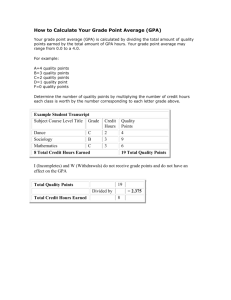

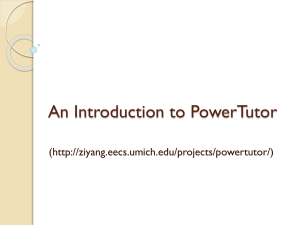
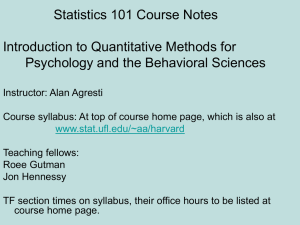
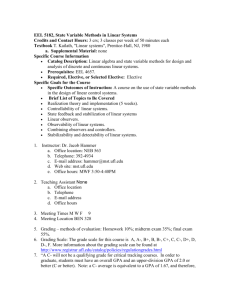

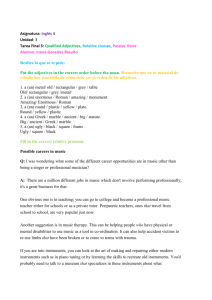
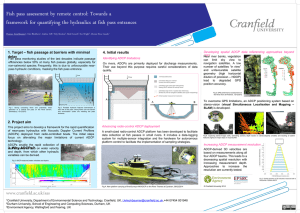
![RV_Samudrika_OCD[1] - National Aquatic Resources](http://s3.studylib.net/store/data/006968597_1-c581bfc34257e9ab61fd82238f7d082d-300x300.png)

